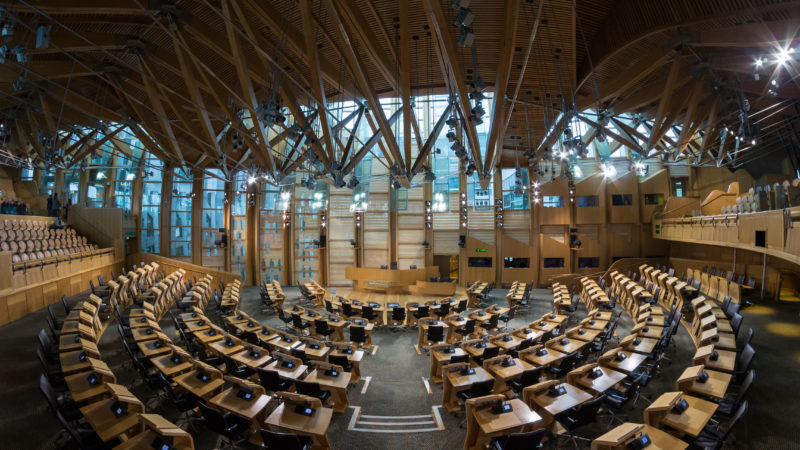
For over 100 years, the right of nations to self-determination has been (at least in words) the one principle that broadly applied across the political spectrum. In 1919, US President Woodrow Wilson convinced the European powers, some more reluctantly than others, to agree to the principle if not the practice. At the same time, Vladimir Lenin was preaching a similar view in revolutionary Russia. During the Cold War, and since, national self-determination has often been a proxy argument used by great powers, whilst also proving a thorn in the side in Afghanistan and in Vietnam. But there is one corner of North-Western Europe where these rules don’t apply. At least not in the Labour Party. Yesterday, John McDonnell appeared at the Edinburgh Festival. He said that a UK Labour government would not infringe the rights of a Scottish parliament to call a referendum on independence, providing it obtained a parliamentary majority to do so. To an outsider, that would probably sound like the common-sense stance of a progressive politician.
But in Scotland, there is a long, torturous history between the Labour Party’s understanding of class politics and nationhood. These agonies have origins in the view that the British state is the instrument best placed to centrally reorganise the economy and to distribute the wealth that it creates in a more geographically even spread. This argument for big state centralisation has been under increasingly popular criticism since at least the 1960s. The effects of centralising tendencies were felt most Scotland, which had its own lineage of distinctive institutions and culture. Resistance to the tendency to make Scotland just another part of the UK was eloquently summed up by the Scottish miners’ leader Mick McGahey, when he addressed the Scottish Trades Union Congress in 1968 to make the case for the establishment of an elected Scottish parliament. Scotland was “not a region of Britain, not a district, but a nation in its own right and entitled to demand a right to nationhood”.
Among McGahey’s biggest opponents were Scottish and Welsh Labour MPs. These diehard enemies of devolution (more commonly known then as ‘home rule’) portrayed it as an abandonment of class solidarity across the UK and a concession to the hated ‘Nats’. They did their best to exercise the right of the Scottish and Welsh Labour Parties to self-determine against national self-determination, leading up to the debacle of the 1979 devolution referendums. In Scotland, despite a majority voting ‘Yes’, the assembly wasn’t established following the imposition of a rule determining that 40% of the total registered electorate had to vote ‘Yes’ to achieve an assembly. This amendment was introduced by George Cunningham, an MP from Scotland who represented an English constituency. Much has been made of Cunningham’s London seat, but he sits comfortably in his cohort of Scottish Labour politicians.
It was Harold Wilson and Jim Callaghan who attempted to impose devolution upon Scottish Labour, with support from trade union allies. Once again, we see a repeat of the same show, but like most remakes, they have the feel of a predictable plot. McDonnell is the unlikely ringer for Wilson, and his main opponents are Scottish parliamentarians and would-be MPs. Ian Murray, the arch-Unionist MP for Edinburgh South, reacted with outrage to McDonnell’s announcement yesterday, insisting that it was a betrayal of the legacy of Scottish Labour’s ‘Better Together’ stance in 2014. This has now been corroborated by a statement from Labour candidates affirming that view, and, incredibly, portraying a campaign that saw Labour and Conservative representatives share a platform as ‘anti-austerity’.
The fuel behind the Yes vote and the subsequent Scottish Labour wipe-out in 2015 was partially revulsion at Better Together, but it was also the culmination of a longer Scottish rebellion against New Labour. That goes back at least to the SNP’s Scottish election victory in 2007 and perhaps the election of a combined total of 13 SSP and Green MSPs in 2003. The class dynamics of Murray’s constituency favour his brand of centrist Labour Unionism, but it’s a proven repeated vote loser elsewhere.
Scottish Labour made a transition of sorts towards ‘Corbynism’ in 2017 when it elected an unashamedly socialist leader in Richard Leonard. But it’s become clear that as a languishing third party, Labour has not regained the right to be heard in Scotland. Too often, party activists talk about ‘winning back’ deindustrialised constituencies and inner-city areas. Scottish Labour’s target voters include younger people who voted Yes but who have never voted Labour. McDonnell’s commitment to a basic democratic stance is the only way that they will start to listen to Scottish Labour. It’s also the only route to Labour being taken seriously in developing proposals for a political revolution as radical as the economic reforms that Jeremy Corbyn stood on in 2017.
The argument for confronting the uneven development of capitalism through the radical decentralisation of the British state is not one that’s been heard in the furore over second referendums and Corbyn’s lack of commitment to the union. There is a principled socialist case for arguing against independence, but it doesn’t come from wielding governmental power to block national self-determination. That would probably be obvious to most of us if it related to any other part of the world.




More from LabourList
‘It’s one year since I became Britain’s youngest MP. Here’s what I’ve achieved so far’
Tribute: ‘David Lipsey’s joie de vivre is missing in Labour politics today’
Ellie Reeves: ‘One year in, the next phase begins – focused on living standards’